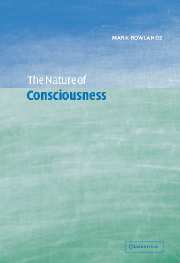Book contents
- Frontmatter
- Contents
- Preface
- 1 The problem of phenomenal consciousness
- 2 Consciousness and supervenience
- 3 The explanatory gap
- 4 Consciousness and higher-order experience
- 5 Consciousness and higher-order thoughts
- 6 The structure of consciousness
- 7 What it is like
- 8 Against objectualism II: mistakes about the way things seem
- 9 Consciousness and representation
- 10 Consciousness and the natural order
- Bibliography
- Index
Preface
Published online by Cambridge University Press: 22 September 2009
- Frontmatter
- Contents
- Preface
- 1 The problem of phenomenal consciousness
- 2 Consciousness and supervenience
- 3 The explanatory gap
- 4 Consciousness and higher-order experience
- 5 Consciousness and higher-order thoughts
- 6 The structure of consciousness
- 7 What it is like
- 8 Against objectualism II: mistakes about the way things seem
- 9 Consciousness and representation
- 10 Consciousness and the natural order
- Bibliography
- Index
Summary
Colin McGinn first got me thinking about consciousness. I was finishing up a D.Phil. at Oxford, where Colin was my supervisor. He had just thought up the basic line of argument behind ‘Can we solve the mind–body problem?’, and I may have been one of the first people he explained it to. I thought he was mad! A decade or so later, when I returned to look at his work, I was struck by how sane the old man had become in the intervening years. Also, much to my chagrin, I was struck by how much my own developing position owed to his. Somewhat in this spirit of chagrin, then, I did my best to distinguish my view from his, and this resulted in chapter 3.
My thinking on the nature of supervenience, and, in particular, on the distinction between ontological and epistemological interpretations, has been profoundly influenced by the work of John Post, as anyone who has read his Faces of Existence – a work of the highest quality – will know. The influence of Sydney Shoemaker will also be evident in many of the pages that follow.
An earlier version of chapter 5 appeared in Mind and Language, as ‘Consciousness and higher-order thoughts’. I am grateful to Sam Guttenplan, Editor of the journal, and to Blackwell publishers for permission to use this work.
Thanks to Hilary Gaskin at Cambridge University Press. Colin Allen, in his capacity as reader for Cambridge University Press, made several helpful suggestions.
- Type
- Chapter
- Information
- The Nature of Consciousness , pp. ix - xPublisher: Cambridge University PressPrint publication year: 2001



